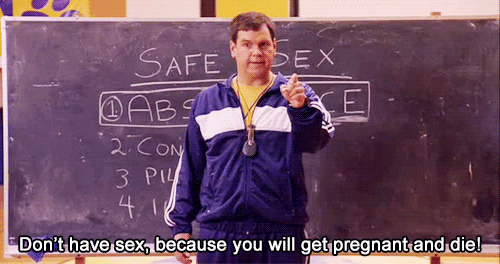5 ways we need to teach about pleasure in sex ed

There’s no doubt that our sex education is woefully inadequate — not just in terms of its delivery, but its substance. Though we need to have comprehensive education for all children covering anatomy, sexuality, gender, and reproductive health, as we look at 2019 it’s time to dream a little bigger — and to start including pleasure in the conversation.
Treating sex as a mechanical, strictly instinctive act isn’t just inaccurate, it’s misleading. Most of sex is nothing to do with reproduction, it’s sex for sex’s sake. It’s sex for the sake of pleasure. When young people aren’t taught about pleasure, their own experiences — their own desires — can become confusing and overwhelming for them — maybe even leaving them feeling dirty, alone, or upset. We need to teach them that sexual pleasure and the desire for sexual pleasure is normal, natural, and gives depth to the sexual experience.
But the question is, where do we begin? Teaching about pleasure may be tricky, but it opens up a whole new world of sex education possibilities. Here’s what we should be aiming for, because young people deserve so much more.

1. Teach that sex is more than pregnancy and STIs
Firstly, it’s time that sex education is about more than just scaremongering.
“Our research shows that nine out of ten (89%) young people are not taught about sex in relation to pleasure – instead, what’s being taught is usually focused on the biological basics, how to avoid pregnancies and so on,” Alex Phillips, SRE policy lead at Terrence Higgins Trust, has explained. Rather than teach that sex is a temptation or a mistake that is bound to lead to pregnancy and STIs, it’s important to put sex into its rightful, wider context. And abstinence-only education needs to go away — immediately. When students think that sex is bad or wrong and then go on to have it anyway, it creates a confusing experience of shame, embarrassment, or even anger with themselves. It’s time for a much more realistic approach.
2. Teach that wanting pleasure is natural
Once you’ve broadened the context that sex is presented in, you can start to discuss pleasure. Not just that sex can feel great — (and it should!) — but also that it’s natural to seek that pleasure. Young people need to be taught that stirrings, exploration, and curiosity are all a totally normal part of puberty and being human. Sexual pleasure isn’t wrong, it isn’t dirty — it’s a part of a healthy sex life. They should be taught the pleasure is something that they’ll explore, learn to understand, and that other people want it just as much as they do. Rather than making students feel alone or different, we need to teach young people — especially young women — that being sexual and feeling sexual isn’t a bad thing.

3. Teach that all pleasure is equal
If pleasure is ever mentioned in sex ed, it’s normally all boiled down to the male orgasm. It’s presented as the goal of sex, the natural endpoint, and often, the only important part. But there’s so much more to be discussed. From the orgasm gap between men and women to different sexualities, genders, and preferences, there needs to be an understanding that all pleasure is equal. People give and receive pleasure differently, different people like different things, but everyone’s pleasure should be equally valued in a sexual experience. The idea of sex revolving around the male orgasm has damaged young people and ruined sex lives for centuries — and it needs to stop.

4. Teach that consent is essential to pleasure
One thing that isn’t discussed enough is consent — while we definitely need more education about consent generally, the link between consent and pleasure is important. Once you understand that sex is about everyone’s pleasure, the importance of consent is obvious. You can teach that consent needs to be clear, constant, and enthusiastic so you can be sure that your partner is having a pleasurable and satisfying experience.
5. Teach how sexual pleasure plays into larger relationships
Finally, teaching sex as totally devoid from personal relationships is not just counterintuitive, it’s damaging. While having sex just for the sake of sex is great, a lot of sex happens in the course of a larger relationship. Your sexual pleasure and satisfaction can affect your relationship — and your relationships satisfaction can affect your sex life. Understanding how sex can be a microcosm of the larger relationship and the relationship between the two is crucial for helping young people navigate their romantic relationships — and, quite frankly, a lesson a lot of adults good learn.
Teaching about pleasure shouldn’t be seen as controversial or taboo, it should be seen as a totally essentially foundation of a holistic sex education. So much confusion and mental strife could be avoided if we taught young people about pleasure right from the beginning. It’s time sex education caught up with the needs of students — and we need it now more than ever.





